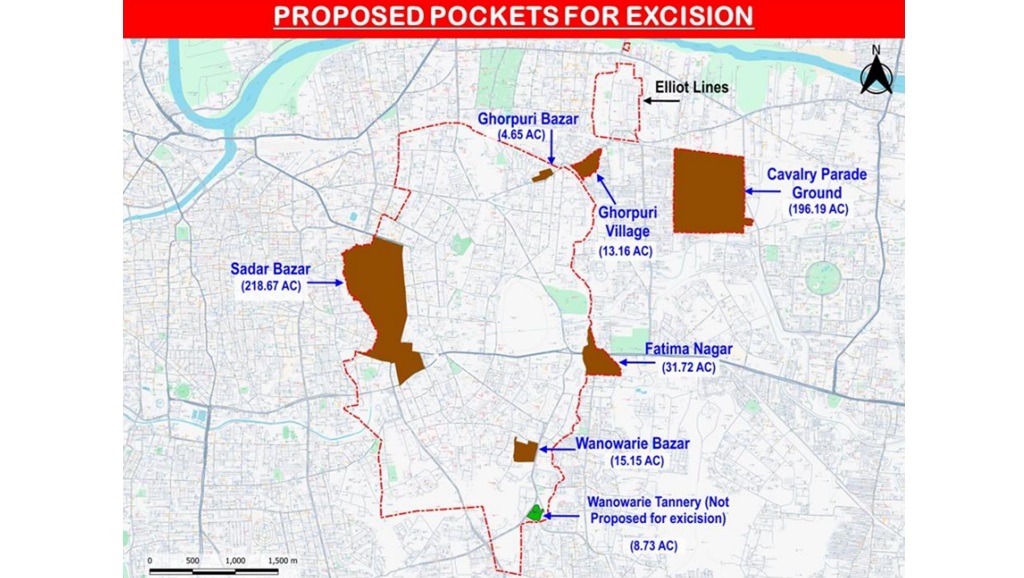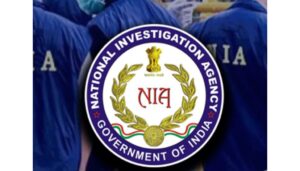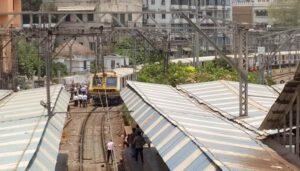Local Military Authority Raises Concerns Over Excision of Civil Areas from Pune Cantonment, Advocates for Maintaining 1 FSI

Mubarak Ansari & Sumit Singh
Pune Camp, 10th March 2024: The Pune Cantonment Board (PCB) has embarked on a transformative journey, proposing the excision of civil areas within the Pune Cantonment limits. PCB CEO Subrat Pal submitted a draft proposal to the Maharashtra State Government on 6th March 2024.
This pivotal decision, as communicated by the Ministry of Defence (MoD), Government of India, has ignited discussions and raised significant concerns, particularly from the Local Military Authority (LMA). The central issue revolves around finding a delicate balance between urban development and the imperative to uphold national security.
In a committee meeting held on 12th February 2024 at MoD, South Block, New Delhi, the Station Commander (Local Military Authority) conveyed pressing security concerns related to the excision of Civil Area. The central contention reached a consensus: ‘No Excision without FSI Restriction.’ Subsequently, during a video conference on 4th March 2024 with the MoD, the Station Commander (PCB) underscored the critical importance of maintaining FSI restrictions to address security concerns.
The letter dated 6th March 2024, conveying these concerns, outlined several key points raised by the Local Military Authority (LMA):
Concerns Raised by LMA:
1. Security of Pune Cantonment: A primary and overarching concern.
2. No Excision without FSI Restriction: Emphasizing the need for controlled development.
3. Road Closure for Homogeneity: Proposes designated pockets with road closures to maintain the cantonment’s homogeneity.
4. Civilian Traffic Management: Suggests that all roads under excision carrying civilian traffic should be maintained by the State Government.
5. Construction Restrictions: Advocates for restrictions and No Objection Certificate (NOC) requirements in the vicinity of A-1 & A-2 lands.
6. Retention of Specific Assets: Specifies the retention of the Slaughter House and Trenching Ground under the management of Pune Cantonment.
7. Land Exchange: Proposes the exchange of vacant C land and A-1 pockets inside the Civil Area with the State Government for Equivalent Value Infrastructure (EVI).
Historical Perspective:
Pune Cantonment, established in 1817 for the British Indian Army, has witnessed substantial growth over the years. Originally designed to accommodate troops, it now finds itself embedded within the expanding Pune City. The proposed excision stems from the changing development profile and guidelines received from the Integrated Headquarters of the Ministry of Defence in July 2023.
The cantonment, covering 2962.0603 acres, is a Class I Cantonment divided into 8 Wards. With a population of 71,781 as per the 2011 census, it is surrounded by the Pune Municipal Corporation and houses vital establishments such as Headquarters Southern Command, Headquarters Dakshin Maharashtra & Goa Sub Area, Command Hospital, AFMC, and various other facilities.
Details of Excision Proposal:
The excision plan involves handing over three notified civil areas – Sadar Bazar, Ghorpuri Bazar, and Wanowarie Bazar – to the Pune Municipal Corporation (State Govt). However, this transfer is recommended with specific conditions and restrictions to safeguard security interests and maintain the homogeneity of Pune Cantonment.
The proposed restrictions for each area include:
1. Sadar Bazar (218.676 acres): FSI restriction of 1.0 within a minimum distance of 100m from the outside civil area boundary or from MG Road, considering its proximity to critical defence establishments.
2. Ghorpuri Bazar (4.657 acres): FSI restriction of 1.0 for the entire bazaar area due to its proximity to important defence establishments.
3. Wanowarie Bazar (15.160 acres): FSI restriction of 1.0 for the entire bazaar area for similar reasons.
The excision plan acknowledges the loss of prime defence land but asserts that it is proposed for the holistic growth of the city. It aims to consolidate the cantonment, envisioning it as a purely military station in the future. Independent pockets within the cantonment, connected by under/overpasses where feasible, are seen as a way to achieve this consolidation.
Other Modalities & Recommendations:
The proposal includes several modalities and recommendations, including the transfer of ownership, road closures post-excision, retention of certain assets by the Cantonment Board and LMA, and protection of Cantonment Board employees’ services post-excision.
The excision plan also outlines the responsibilities of the State Government and Municipality concerning litigations, road management, traffic, civic services, and the applicability of FSI guidelines.
Land & Moveable / Immoveable Assets:
The proposal underscores the transfer of propriety rights of the Government of India in the Ministry of Defence, in all properties and all assets & liabilities in respect of the excised areas to the State Government. While vacant land ownership remains with the Ministry of Defence, the State Government is granted flexibility in reallocating lands. If the State Government disposes of any transferred land, 50% of the income derived must be paid to the Government of India, and the remaining financial benefits should exclusively benefit the excised area.
Cantonment Board Employees:
The services of Cantonment Board employees, along with their service conditions, will be protected post-excision of Civil Areas of the Cantonment.
Civic Services:
The Cantonment Board shall be allowed to use, free of cost, the immoveable assets for the excised area, such as godown facilities, till alternative arrangements are made by the Board, but not exceeding six months from the date of excision. The water supply responsibility shifts to the Pune Municipal Corporation post-excision, while the Cantonment Board and the Military Engineering Services (MES) shall continue maintaining existing facilities.
Road Management & Traffic:
The State Government and the State Municipality should ensure that all road networks in the excised area are maintained to allow for necessary widening. The proposal suggests specific roads to be closed post-excision, primarily in eight pockets of the twelve independent pockets proposed post excision, to achieve access control within these major pockets and safeguard the security concerns of the station.
Litigations in the Excised Area:
All litigation cases for the excised area become the prime responsibility of the State Government / State Municipality. The nature of litigation cases includes unauthorized construction, encroachment, property tax, and service matters.
Pensioners:
The pension liability in respect of employees to be transferred to the State Government / State Municipality will rest with the respective entities. The remaining pensioners and employees’ pension liability shall rest with the Cantonment Board or the organization where they are eventually absorbed.
Applicability of FSI Guidelines / Restrictions:
The current FSI restrictions, as applicable in Pune Cantonment (i.e., 1.0 for Civil Area and 0.50 for the Outside Civil Area), will remain the same post-excision, in view of security reasons, as elucidated by the LMA.








